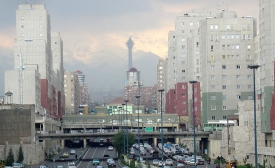sanctions

In the wake of the World Anti-Doping Agency's sanctions against Russia, the nation's soft power has taken a hit with Russia losing opportunities to conduct diplomatic activities.

Reprinted from the CPD Blog by Rob Asghar (Apr 22, 2013)
Opposition to the deal based on issues unrelated to the nuclear program is not new, nor is the “white savior complex” exhibited by many in the U.S. government when it comes to human rights in other parts of the world.
For proponents of targeted, or “smart,” sanctions, it was unquestionable proof of such punitive financial measures’ effectiveness as a foreign policy tool. They may be right. The unprecedented regime of UN, regional, and national sanctions leveled against Tehran was instrumental in slowing its progress toward nuclear weapons capability and bringing Iran’s leaders to the negotiating table.
Gov. Cuomo heads to Cuba Monday on a trade mission that critics charge is aimed more at generating headlines than creating economic opportunities for New York. Cuomo will leave Monday morning and will spend just over a day on the island nation in what administration officials insist is an effort to open pathways for New York businesses.
Sanctions have become as sacred to western armouries as nuclear bombs were 50 years ago. No one dares question them for fear of being thought a dove or a wimp. They cost little to the aggressor but make them feel good. They repress trade rivals. They attract macho adjectives, such as tough, meaningful, targeted and smart. They are chiefly aimed at domestic consumption. Only the poor (and a handful of rich) in the victim states suffer.
Just a week after agreeing on a framework for a nuclear deal, Iran’s supreme leader and the Obama administration clashed over its core elements, rekindling doubts about whether Washington and Tehran can finalize an accord by a June 30 deadline. The supreme leader, Ayatollah Ali Khamenei, in his first public comments on the diplomacy, said on Thursday the U.S. and its negotiating partners must lift all sanctions on his country immediately upon a final deal being signed.
It is perhaps only an accident of history that three of the key actors in the diplomatic efforts to deny Iran a nuclear bomb are the 2004, 2008, 2012 and probable 2016 Democratic presidential nominees. But their intertwined ambitions provide a dramatic backdrop to the unfolding and unfinished story.







